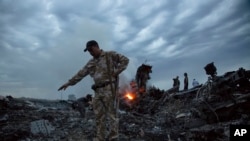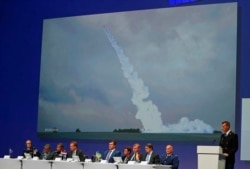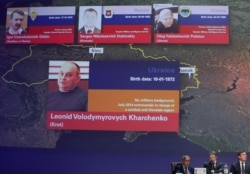The Dutch-led team investigating the 2014 downing of the Malaysian Airlines jet over Ukraine has released new phone intercepts, saying they show ties between Russian military and political officials and separatists in eastern Ukraine were much closer than previously known.
The intercepts were released on November 14 as part of a new push by the Dutch team, known as the Joint Investigative Team (JIT), seeking new witnesses for the crash of MH17, which killed all 298 people on board.
In June, Dutch prosecutors announced that three Russians and one Ukrainian would be put on trial in the Netherlands for their alleged involvement in the incident.
In announcing the charges, prosecutors said there was evidence of a direct line of command between Russian officials and separatists who were fighting in eastern Ukraine and had announced the formation of an unrecognized government called the "Donetsk People's Republic" (DNR).
Russia has repeatedly rejected the conclusions of the Dutch-led team, and the evidence pointing to the presence of the Buk missile in eastern Ukraine at the time of the jet's downing.
MH17 was flying between Amsterdam and Kuala Lumpur when it exploded and crashed in territory in eastern Ukraine held by pro-Russian fighters on July 17, 2014.
The JIT has said that a sophisticated antiaircraft missile system known as a Buk was used in the attack, and that the weapon came from Russia.
In a statement accompanying the release of the intercepts, the JIT said it was seeking more witnesses as prosecutors compile more evidence ahead of the trial of the four men, scheduled for March 2020.
"Recent analysis of witness statements and other information revealed that Russian influence on the DPR went beyond military support and that the ties between Russian officials and DPR-leaders appear closer," the team said.
"The intensity of Russian influence is relevant to investigating further persons involved in the downing of MH17. That is why today the JIT releases this new appeal for witnesses," the JIT said.
A spokeswoman told RFE/RL that the intercepts were obtained by the JIT from Ukraine's main security agency, the SBU.
In the intercepts, which were published on YouTube and date from July 2014, according to the JIT, several men can be heard discussing what appears to be a chain of command.
In one, which the JIT said was placed at the beginning of July 2014, a man who appears to sound like a commander tells another that "men are coming with a mandate from Shoigu" -- a reference to Russian Defense Minister Sergei Shoigu.
In another call dated March 2015, a man whom JIT identified as Leonid Zakharchenko, a military intelligence officer for the separatists, is heard discussing with another man about a third man's potential legal problems.
The conversation repeatedly mentions the name Surkov -- a reference to Vladislav Surkov, a top adviser to Russian President Vladimir Putin.
Other prominent individuals that JIT said were mentioned in the intercepts include Igor Girkin, a top separatist commander in eastern Ukraine who was among the four charged by Dutch prosecutors, and Sergei Aksyonov, who became the Russian-appointed leader in Crimea after Moscow annexed the Ukrainian Black Sea peninsula in March 2014.
In Moscow, Russian Foreign Ministry spokeswoman Maria Zakharova told reporters that the new recordings were "fake" and "unconfirmed," and accused prosecutors of concocting evidence to fit a predetermined verdict.
The four suspects accused by Dutch prosecutors are believed to be in Russia, which is not expected to hand them over for prosecution.






